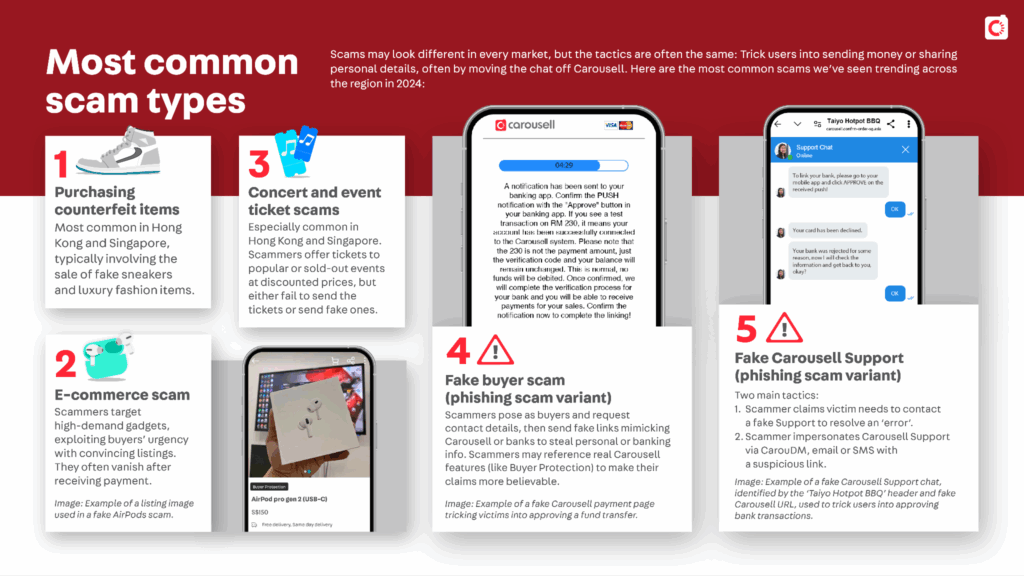Carousell, a leading multi-category online marketplace in Southeast Asia, Hong Kong and Taiwan, released its 2024 Regional Scam Trends Report on 30 July 2025. The report reveals the five most common online scams targeting consumers and outlines its internal efforts to combat fraud across its platform.
The eight-page document was compiled by the Carousell Trust Working Group and includes both police-reported incidents and user reports. It identifies major scam categories and offers data-backed prevention strategies for online shoppers and sellers.
Among the key findings, Counterfeit Items top the list, with scammers targeting fashion-conscious buyers, particularly in Hong Kong and Singapore. Fake luxury goods and sneakers were common bait.
E-commerce Scams rank second. Here, fraudsters list high-demand electronic gadgets to capitalise on buyer urgency, then vanish after receiving payment.
Concert and Event Ticket Scams also featured prominently. These involve scammers advertising tickets to sold-out events—especially in Hong Kong and Singapore—and delivering either fake or no tickets at all.
Another tactic involves Fake Buyer Phishing, in which scammers pose as interested buyers and send phishing links disguised as Carousell or banking portals. These links are intended to extract sensitive personal or financial information.
The fifth category, Fake Carousell Support, involves fraudsters impersonating Carousell’s help team through chat or SMS. They typically report fake “errors” and coax users into revealing confidential account details.

While these scams were regionally widespread, Carousell noted that the most prevalent scam type varied across markets in 2024:
- Malaysia: Fashion Item Scams involving sellers disappearing after payment.
- Hong Kong: Ticket Scams capitalising on popular events.
- Taiwan: “50% Off” Scams using unrealistic discounts to pressure buyers.
- Philippines: Digicam Scams targeting photography enthusiasts.
- Singapore: “Enabler” Scams recruiting users through fake job offers to host scam listings.
To combat these threats, Carousell deployed a multi-layered defence strategy. The platform blocked more than 1.28 million phishing links, 727,000 email addresses, and 20,000 QR codes embedded in chats that posed security risks.
Additionally, 23 million in-app safety alerts were issued throughout the year to warn users in real-time about potentially suspicious behaviour or listings.
Carousell also suspended 422,000 suspicious accounts and reviewed 309,000 user reports, ensuring swift intervention against active scammers.
Mr Gijs Verheijke, Director of Trust and Customer Experience at Carousell (Singapore), emphasised the platform’s focus on user empowerment.
“User education has always been a cornerstone of our trust strategy,” he said. “By revealing scammers’ playbooks, we’re empowering sellers to spot phishing attempts and helping buyers question suspicious deals.”
The report also outlines practical safety tips for buyers and sellers. These include:
- Stay within the platform: Use Carousell’s built-in chat function. Scammers often ask to move conversations to apps like WhatsApp or Telegram to avoid monitoring.
- Use platform-integrated payment tools: Carousell’s ‘Buy’ button ensures funds are only released after the buyer confirms receipt and satisfaction.
- Never share personal details: Carousell transactions do not require users to provide emails or passwords. All key functions are managed securely within the app.
To expand outreach, Carousell is launching a month-long safety campaign on its platform and social media channels to raise awareness among users.
The report and its accompanying initiatives position Carousell as a proactive force in the battle against online fraud, especially at a time when digital transactions continue to rise across the region.
By arming users with knowledge and enhancing its backend security, Carousell aims to reduce vulnerability and reinforce user trust in online marketplaces.
Key points summary:
- Carousell’s 2024 report identifies five top scam types, including counterfeit goods and phishing attempts.
- The most common scams vary by country, such as ticket fraud in Hong Kong and fashion scams in Malaysia.
- Over 1.28 million phishing links and 727,000 email addresses were blocked in 2024.
- More than 23 million safety alerts and 422,000 account suspensions were issued across the platform.
- Carousell is launching a user education campaign to improve scam awareness and digital safety.
Carousell’s Trust Working Group published the report after reviewing extensive community data and enforcement actions taken throughout 2024.
The post Carousell’s 2024 report reveals top online scams and blocks over 1.28 million phishing links appeared first on The Online Citizen.


